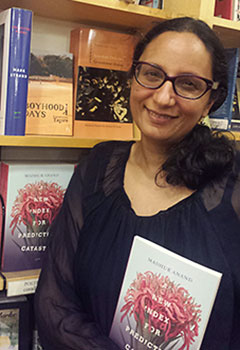 Scientists call it a “critical slowing down.” Perturb an ecosystem, and natural resilience allows the system to bounce back. Keep on challenging the ecosystem, and it takes successively longer and longer to recover.
Scientists call it a “critical slowing down.” Perturb an ecosystem, and natural resilience allows the system to bounce back. Keep on challenging the ecosystem, and it takes successively longer and longer to recover.
Then comes the so-called “tipping point,” when things shift irreversibly into a new state, says Prof. Madhur Anand, School of Environmental Sciences.
Watch closely enough, she says, and you can see the change coming. “When the time to recovery lengthens, that’s a signal.”
Add one more helping of nitrogen or phosphorus, for instance, and a lake goes green. Or closer to home for Anand, place one more stressor on woodlands and watch what happens. “I work with forest-grassland systems. Things can shift from forest-dominated to grassland-dominated unexpectedly.”
That sense of life on the edge — with its alternating current of anticipation or foreboding — underlies many of the poems in her debut collection appearing this spring.
A New Index for Predicting Catastrophes is being published by McClelland and Stewart. CBC lists the book as one of 10 “trail-blazing” poetry volumes to read during National Poetry Month in April.
Earlier versions of some pieces by this scientist-poet appeared in periodicals, including the Literary Review of Canada, Lemonhound, Room, Grain and The New Quarterly.
Many of the poems reference her research, using images of nature and ecology as a theme, or to provide a metaphor for human experience or emotion.
Anand, a University Research Chair at Guelph, was invited to submit her manuscript by U of G English professor Dionne Brand, a renowned poet and novelist, and a member of the publisher’s poetry board.
“It’s something I’ve been always dreaming about,” says Anand of the publication of her collection.
Change, time’s passage, how large events are sometimes made trivial— they’re all preoccupations for both the scientist and the poet inside her.
“Parle-G” looks at how migration widens the distance between generations. In “Hill Country, Old Mercedes, and Parturition,” the narrator considers the tipping point and that critical slowing down. “Somewhere, A Lake” reflects on how “simple steps inflate hours.”
Most of the poems are written in 13-syllable lines rather than using a more common metre. That unusual structure provided a frame for her writing. “Total free-form was often too loose. The constraint somehow demanded something of me.”
Experimenting further with form and approach, she wrote several “found” poems whose words and phrases are strung together from actual lines in her various research articles.
She doesn’t normally think about poetry while writing a scientific article, but her found-poem exercise forced her to think about how science and her writing play off of each other.
“I started to reread my articles with greater appreciation and enjoy the language when I found words I could use in a poem,” she says. “It really was a way of embracing this dual existence of a scientist and a poet.”
The lesson? She needs both, even if there’s still some mystery about the connections.
“I think we are all poets and scientists,” says Anand. “What I’m hoping people will realize is that in the end poets speak to everybody. I’m not just speaking to scientists or poets. We are all a part of both of those worlds.”
Anand, 43, joined U of G in 2006. She started writing seriously about 15 years ago as a newly appointed professor in theoretical ecology at Laurentian University.
She will read from her collection in Guelph at the Bookshelf Cinema May 6, at 7 p.m., in a double bill with author Jane Urquhart, whose new novel is The Night Stages.